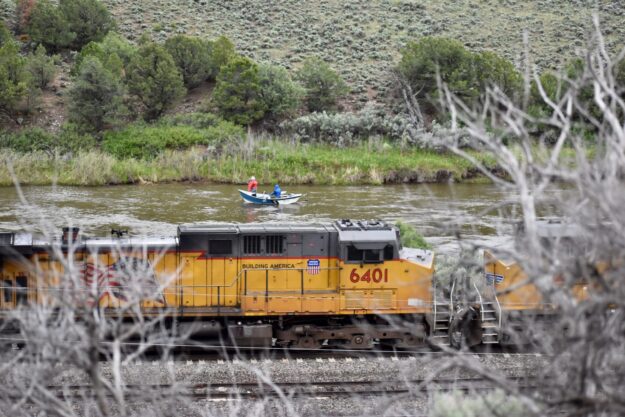Widgetized Section
Go to Admin » Appearance » Widgets » and move Gabfire Widget: Social into that MastheadOverlay zone
Utah residents rail against plan to pay for oil trains with federal tax-exempt bonds

Anglers fish on the Colorado River near an idle Union Pacific freight train in western Grand County in June of 2023 (Chase Woodruff/Colorado Newsline).
The group pushing for a rail line in eastern Utah that would allow the state to ramp up oil production is hoping to fund the project through $2.4 billion in U.S. Department of Transportation bonds.
The Seven County Infrastructure Coalition for years has been lobbying for the 88-mile Uinta Basin Railway, which would connect the oil-rich region of northeastern Utah to national rail lines, facilitating the export through Colorado of waxy crude oil to refineries on the Gulf Coast.
To pay for the Utah railway, the coalition — which consists of representatives from Dagget, Carbon, Duchesne, Emery, San Juan, Servier and Uintah counties — approved a resolution last month announcing its intent to seek $2.4 billion in private activity bonds from the U.S. Department of Transportation.
That’s a $500 million increase from 2023, when the coalition passed a similar resolution seeking $1.9 billion in federal bonds.
The railway extension could allow for the transport of an estimated 350,000 barrels of oil each day, massively increasing the state’s oil production. The refineries in Salt Lake City, for instance, currently have a market capacity of 85,000 barrels per day.
But connecting the Uinta Basin to national rail lines means increased oil exports through Colorado, which has proved to be a major sticking point. In 2022, environmental groups and Colorado’s Eagle County sued the coalition, arguing that the federal Surface Transportation Board — the agency tasked with the environmental review — fell short in its analysis, failing to consider the risks of the railroad expansion.
The project cleared a major roadblock in May after the U.S. Supreme Court overturned a prior court ruling that found the environmental review was incomplete. The ruling returns the case to a lower court for consideration.
“This was not only a win for the Seven County Infrastructure Coalition and counties in the state of Utah, but a win for the United States in being able to move forward with a major infrastructure project,” said Greg Miles, a Duchesne County Commissioner who sits on the board of the coalition, during a public meeting Thursday. “There’s a lot of things that oil does for us in our lives.”
And although it still faces regulatory and legal hurdles, the coalition has made several moves over the last month toward financing the railroad. On Thursday, it heard public comments related to the bonds.
The Department of Transportation’s Private Activity Bonds program is a tax-exempt financing option from the federal government aimed at supporting private-public partnerships. The program has financed bridge replacements, highways, rail lines and other transportation-related ventures.
That $2.4 billion is the total estimated cost for the project, according to the coalition, although it’s unclear how much money will come from private investments.
But funds for the bond program are running dry. According to the department’s data, there’s only $500 million left to allocate, the program having dished out $29.4 billion of its $30 billion cap. It’s up to Congress to replenish the program.
“How is the coalition going to get this money? And when?” asked Deeda Seed with the Center for Biological Diversity during the meeting Thursday.
Seed also raised concerns over the “ballooning” cost of the railway, which has increased in the last few years.
“How does this project pencil out? We have no clue, the public has no clue, especially when President Trump hopes the price of oil will decline to $40 to $50 per barrel,” she said.
Just about all of the roughly two-dozen commenters on Thursday spoke against the railway, and using bonds to fund it — they cited concerns over the project’s rising cost, potential harm to wildlife and habitat, the negative impact on air quality, and how a derailment could harm the Colorado River and the people who rely on it for drinking water.
“I deplore subsidizing the increase of oil production in the Uinta Basin, which will increase the ozone and air pollution, at a time when all federal subsidies are being cut for renewable energy,” said Joan Entwistle, a Summit County, Utah, resident. “It’s just another example of how we’re putting the thumb on the scale for fossil fuels.”
“The tariffs are being imposed at a level of 50% for steel. Clearly, that is going to raise the prices. Railroads are notorious for cost overruns,” said David Bennett, also a Summit County resident.
Attorneys for Eagle County and environmental groups suing to stop the Uinta Basin Railway told RealVail.com last week they expect President Donald Trump will try to force the rail project through using an executive order.
Editor’s note: This story first appeared on Utah News Dispatch, which is part of States Newsroom, a nonprofit news network supported by grants and a coalition of donors as a 501c(3) public charity. Utah News Dispatch maintains editorial independence. Contact Editor McKenzie Romero for questions: info@utahnewsdispatch.com.
Kyle Dunphey
Latest posts by Kyle Dunphey (see all)
- Utah residents rail against plan to pay for oil trains with federal tax-exempt bonds - June 16, 2025
- Senate likely to rekindle GOP efforts to sell off public lands for billionaire tax cuts - June 4, 2025
- Utah officials eager to mine public lands see an ally in Trump pick for interior secretary - January 19, 2025


